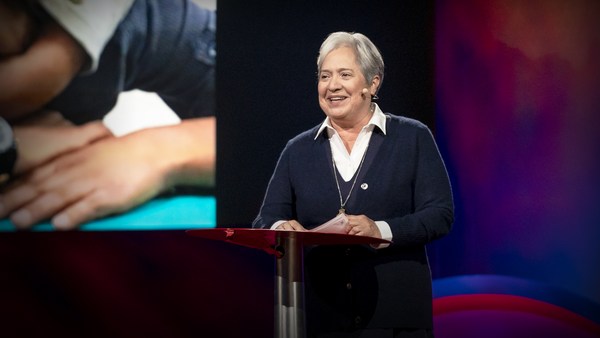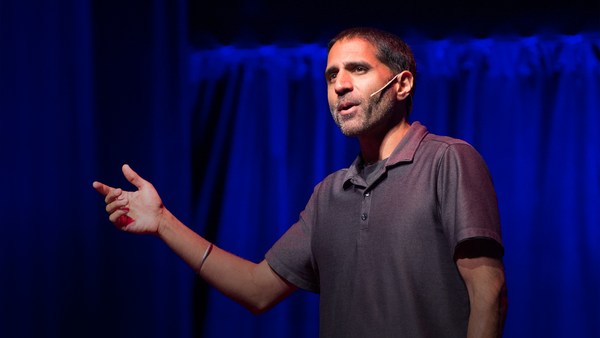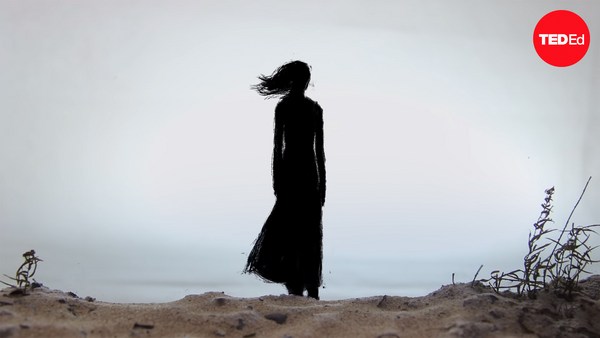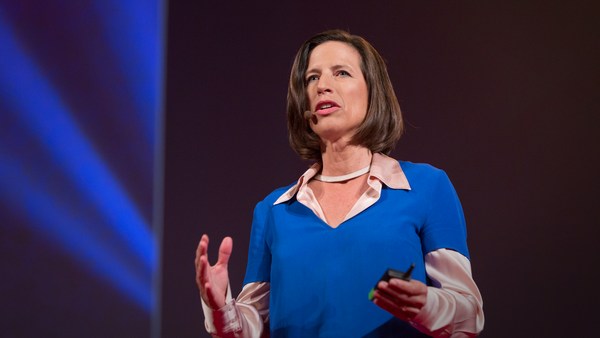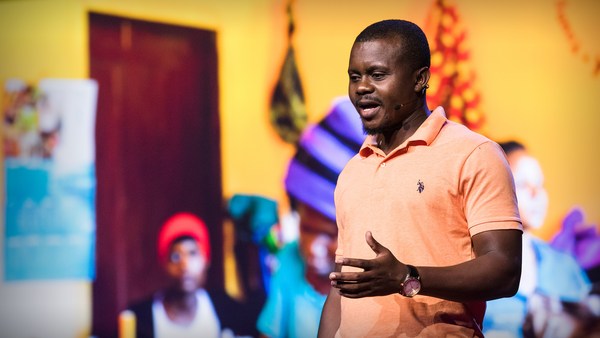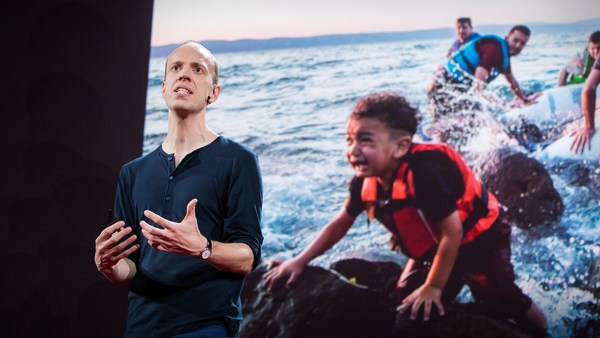Several years ago a young man came to see me in my clinic. He told me he was running for his life. He said that he fled his home, because there, homosexuality wasn't just illegal, in some cases it was punishable by death. So when his sexual orientation was exposed, his family rejected him, his boss fired him and angry mobs repeatedly attacked him in the streets. And each time the police arrived only to arrest him, detain and torture him further. And he knew that if he couldn't escape the cycle of violence, he would surely be killed.
So he had to do what he needed to do to survive. He left everything behind. All of his friends, his family, his career. He fled his home, he escaped to the United States and here he applied for asylum.
But like many people fleeing this kind of persecution, he couldn't carry much. He had some basic ID, barely any money and a few other belongings. He certainly didn't bring official documents from the police who tortured him. No videos from the mob that tried to kill him. He didn't have this kind of evidence to help support his claims, yet here he was, sitting in my clinic, showing me some of the most powerful evidence of his persecution. That was the physical and psychological scars that he brought with him. You see, he suffered from chronic, debilitating pain. He had severe scars scattered over his body, poorly healing wounds that got infected over and over again. He suffered from severe depression and continued to have regular, paralyzing flashbacks and nightmares from PTSD.
So we continued our work. We met regularly for months, documenting each of these pieces of medical evidence. We went over the details of every attack, photographed his scars, documented his injuries and wounds, and we were even able to start chronicling his slow but steady recovery while under our care. Working closely with his lawyers, I submitted a detailed affidavit, including the findings of this forensic medical evaluation, and we included it as part of his asylum application. And then we waited for several long years while he navigated the courts.
And then one day I got an email from him. It said that he was granted asylum. And everyone in the clinic was overjoyed. He said in his email that this was the first time in years that he didn't fear deportation and death. It was the first time in years that he truly felt safe, that he had the security to rebuild his life all over again. And it was only through this medical and legal advocacy that we were able to help restore his legal status and his rights, that he could do that, all through asylum.
Now for many people fleeing persecution, they come to programs and clinics like this telling unimaginable tales of violence and different reasons they were persecuted. But one thing is always the same. The violence meted against them was done with complete impunity, sometimes by the hands of the state directly through police or military officials. In other cases, the state just turns a blind eye and condones the acts of paramilitary groups or even violent domestic partners. In other cases, state is completely powerless to protect the vulnerable from powerful gangs.
Now we know that social determinants of health play a huge role in determining the health and well-being of our patients: housing, income, education, race, social inclusion. But the same can be true for equal protection in the law -- due process. Especially in societies for the most vulnerable, the marginalized and even those who are actively targeted, their access to these human rights protections that can mean the difference between sickness and health, and often it's the difference between life and death. And for millions of people who endure persecution and torture, the only way to heal is to acknowledge the human rights abuses that have occurred and to help restore the rights and protections that were so violated.
After the atrocities of World War II, the asylum system was set up as one pathway to that kind of relief. But these days it seems like that pathway has turned into an obstacle course, setting people up to fail. Asylum seekers oftentimes don't know how to start, let alone complete the process that can drag on for years. They're not entitled to lawyers, so they don't know their rights. Increasingly, they're even being barred from setting foot in places of potential refuge. They're arrested or prosecuted, even deported before they ever get to see an asylum officer. And even if they do make it through the process, asylum grant rates can be as low as 20 percent and far worse for some. It's almost like the system was designed to keep people from exercising their right.
But there is something that many of these people can do. Something that can potentially increase their chances of success to 90 percent or more. So what makes the difference? Getting a lawyer and having a medical evaluation. It's as simple as that. The man who came to my clinic and won his asylum case. Doctors and lawyers working together to present all of the evidence, including the medical evidence, to the courts allows judges to make informed and just decisions.
And it's this kind of medical-legal partnership that's now more important than ever, because we live in a time of epic, forced migration due to violence and conflict. In 2018 there were 70 million people worldwide forcibly displaced due to war, conflict and persecution. It includes 40 million internally displaced, 25 million refugees and three million asylum seekers. Here in the United States, we see the impact of escalating violence in places like El Salvador, Guatemala and Honduras, where murder rates can be as high as those in Syria and Afghanistan. Where police corruption and gang violence are on the rise, where poverty and child abuse are widespread and tolerated, where basic systems of governance -- public safety, child protection -- are ineffective.
It's no surprise then that many of the most vulnerable in some of these societies -- children, women and other targeted groups -- they're growing increasingly desperate and fleeing in unprecedented numbers. Like over the past 10 years, the numbers of unaccompanied children trying to seek safety at our southwest border has increased 18-fold, from 3,300 in 2009 to over 62,000 this past year. That's in addition to nearly half a million people traveling as families. Men, women and children trying to seek refuge at our borders, but who are stranded in a humanitarian crisis.
And what makes matters worse is that they're caught in this fog of claims and counterclaims about who they are, what they've experienced, where the proof is and what they deserve. Do they deserve our help? Sometimes people make claims that they're not fleeing human rights abuses but are simply economic migrants. Others say these children are actually being exploited and trafficked by their parents. Others say they're not even children at all; they're hardened criminals, they're gang members trying to infiltrate our country.
To cut through some of this fog, my colleagues and I conducted a study. We looked at data from children seeking asylum who had medical evaluations. And this is what the evidence told us. 80 percent of these children had evidence of exposure to repeated physical violence: assault and torture. 60 percent of the girls and at least 10 percent of the boys had evidence of repeated exposure to sexual violence. One young girl, telling a story and having corroborating evidence of being detained, beaten and raped over the course of three years, trafficked to other men and even having the threats of the murder of her entire family if she should ever escape or try to seek help. 90 percent of these children had evidence of psychological harm from indirect violence, including such severe threats, but also witnessing untold atrocities with their very eyes.
One young boy described the terror and the grief and the utter fear of seeing the mutilated bodies and faces of his younger brother, his aunt, his uncle, his cousin, all killed in a single gang attack meant to send the community a message.
And of course the psychological toll is immense. 19 percent of these children had signs of anxiety disorder; 41 percent, depression and 64 percent, PTSD. 21 percent also had signs of suicidality as children. To put this into some perspective, returning combat veterans, they have PTSD on the order of 10 to 20 percent. These children at three to six times more likely to have PTSD than a soldier returning from war.
Now despite this burden and despite this trauma, there are many others, still. Children who come to seek safety and enter into our immigration system only to find further abuse and even torture reminiscent of the places that they fled. You might remember some of those headlines, some of those images this past year. Children being ripped from the arms of their parents. Toddlers, infants in cold and unsanitary cages. The absence of food, water clothing and even soap. There's also increasing reports of medical negligence, preventable complications, child abuse, sexual abuse and even child deaths in US custody. Sadly, many of these abuses and crimes aren't new. Some date back many years and even across administrations. But something's changed. The scope and scale of these abuses and crimes, the systematic and seemingly purposeful endangerment of asylum seekers and also the impunity with which it's being done has raised the harm to an entirely new level.
It reminds me of one of the girls in the study who told us how she pleaded with one of her attackers, asking him to stop, asking why she was targeted. And do you what his response was? He says, "We can do this, because there's no one here to protect you."
We can't let this be true of children and other asylum seekers trying to find help at our borders. But what do we do? As a physician, I'm often dealing with difficult decisions with some of my sickest and most complex patients. Of course we want to keep our focus on their health, their well-being, their quality of life, but sometimes it requires a deeper exploration of their values to really understand how to move forward. In a similar way, our nation is facing a crisis with the increasing number of asylum seekers at our borders and in our communities, and it compels us to re-examine some of our own fundamental values.
What does it mean when we value health and safety? What does it mean when we value security, life, liberty, the life of children? What about this one -- what does it mean when we say we value law and order? Does that also include respecting due process rights for an asylum seeker?
Now for some, when they hear these terms they immediately gravitate towards wanting to build more walls, deploying more border patrol, deporting more people even if it means separating children from their families, subjecting them to psychological torture or deporting them to places where they might die. All in the name of security. All in our name.
But for me and for many others, when I think of these values, that pushes me in an entirely new direction and renews my commitment to try to meet the needs of these asylum seekers with every tool I have at my disposal. So that when we say that we value life and liberty, we'll see these people who have taken unimaginable risks to flee imminent danger and harm to try to find safety. We'll meet them where they are and provide food, water, shelter, clothing. And we'll certainly meet them with medical care and mental health care that they so desperately need. When we say that we value the rule of law, and not just the privileges it provides a few but the responsibilities it requires of all of us, we'll make sure that we have a functioning immigration system. We'll make sure that we have trained judges. We'll make sure that we're not settling for the illusion of law and order that maybe a tall wall or a militarized border might provide us. We want the real thing. We want judges to be able to evaluate the evidence, including the medical evidence, and we want them to administer justice ... fairly.
When we say that we value health and well-being, that we don't want to perpetuate harm, then we'll deploy trauma-informed strategies at all levels of the immigration system. It might start with retraining border patrol agents or immigration officials, but it needs more medical, mental health and child welfare experts across the whole system.
And when we say that we value justice, we won't let ourselves be turned into the torturers that many of these children and other people fled. We'll open up our detention centers and our courts to experts and advocates to hold ourselves accountable. And we may find that we need to shut down most of them and close these camps.
I believe that by working in effective partnerships with lawyers, doctors, human rights advocates and many others, that we can work together to meet these asylum seekers' needs, that we can meet our historical, humanitarian and legal obligations to them. And when we do, I think something powerful will unfold. Not only will these asylum seekers -- like the man who came to my clinic and won his asylum case, like the children in the study or the many thousands of others seeking a new life, they'll be able to find that safety and security. We'll recognize the abuses that have occurred, and we'll restore the rights and protections that were lost. And I think that we'll be in wonder when we see them in the fullness of their humanity. Not just their strengths and weaknesses, their hopes and joys, not just the trauma that we acknowledge, but we'll also stand with them and we'll be inspired by their resilience. They'll blossom, and they'll add to the richness of this nation.
I think by staying true to our fundamental values in the way that I've described, that's how we build a sane and humane immigration system. That's how we remain the golden door. And that's how it happens that we remain the shining light of the world.
Thank you.
(Applause)
